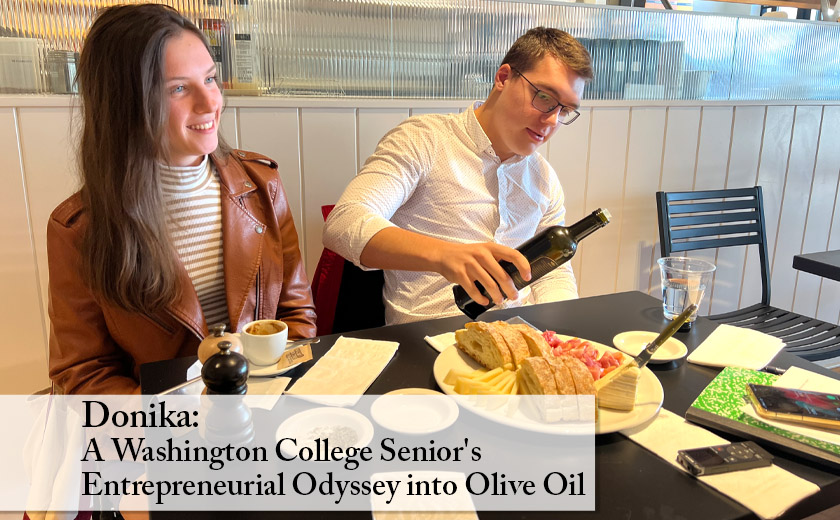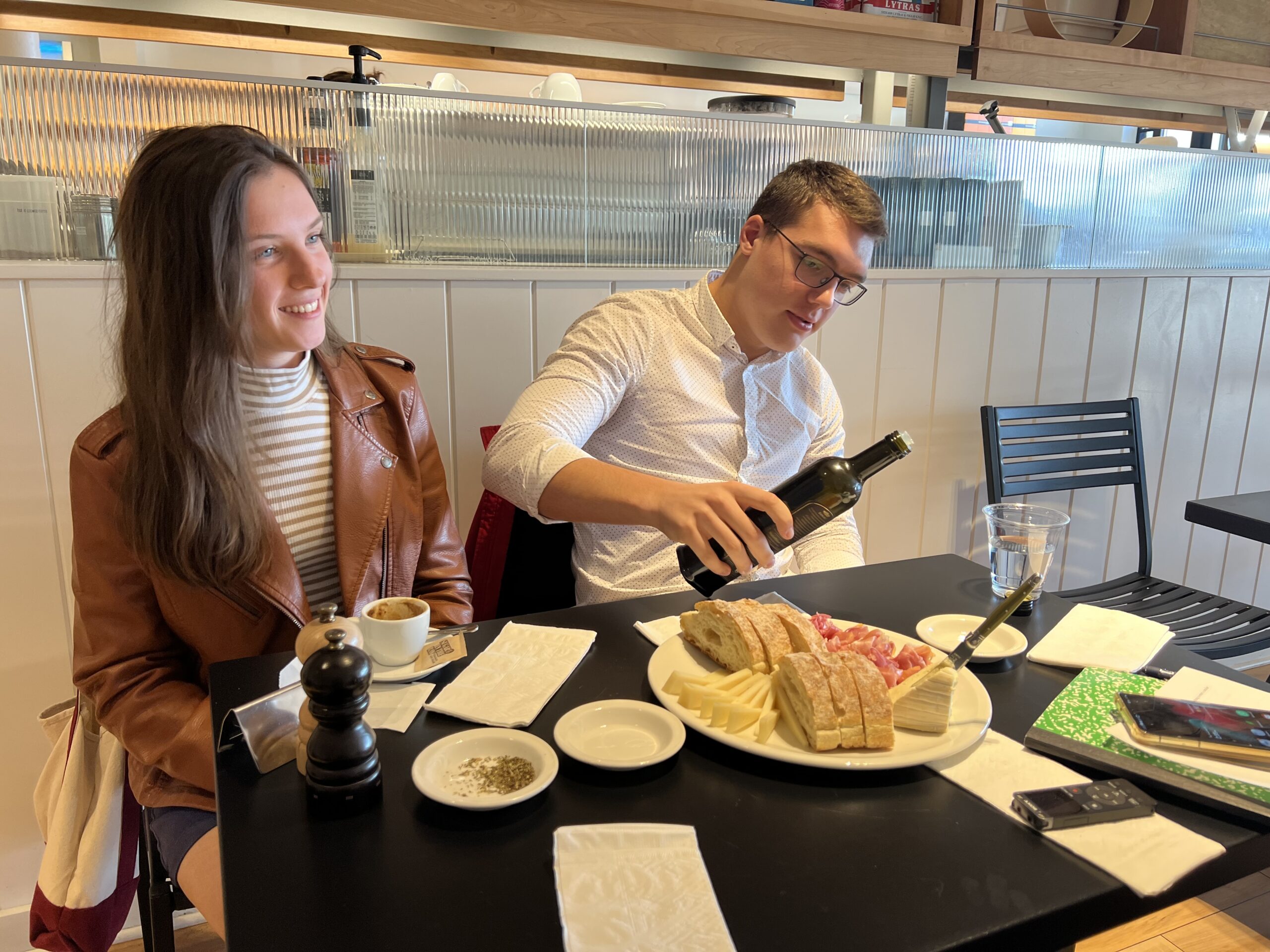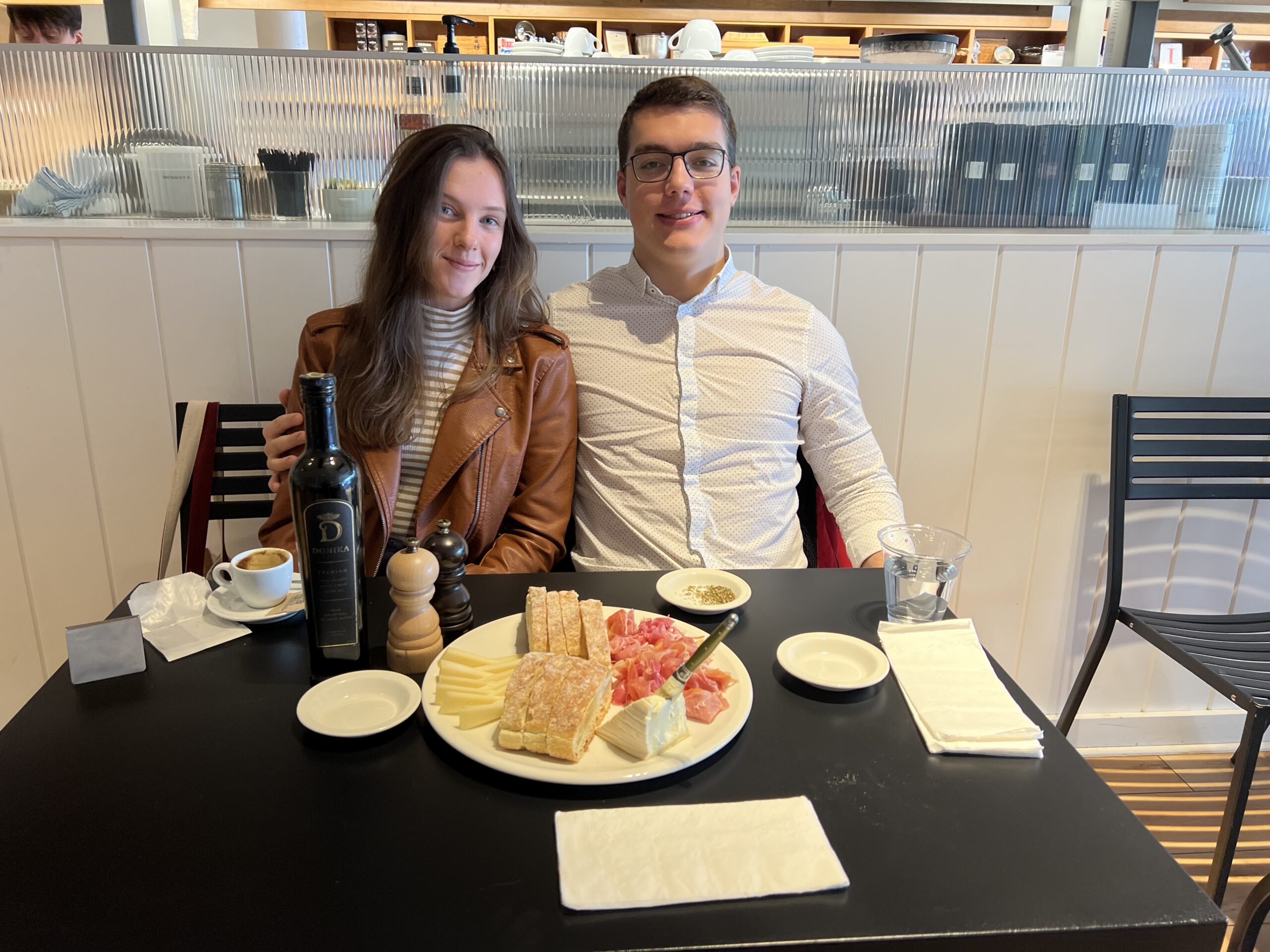Remember what you were doing when you were 21? Maybe just finishing school and looking for a job or furthering your education. Or maybe you were already working and anticipating weekends and holidays for well-deserved breaks.
Now, meet Bianti Danaj, a business major at Washington College, former captain of the men’s swim team, and about to graduate next year. Unlike most of his peers, he’s not following the typical post-graduation paths. Instead, he’s building and running an unconventional venture–importing olive oil. And no, it isn’t a family legacy. It’s something he independently decided to pursue.
Although a U.S. native, Danaj’s first 14 years were spent in Albania when his parents returned to their homeland. After coming back to the U.S., he felt the absence of the fresh, organic foods he had grown accustomed to. “Because Albania had been a dictatorship before 1991, we didn’t have any industries that polluted the land,” he said. “And with it being located in the middle of the Mediterranean, the weather favors a lot of agriculture, and it was organic foods I mostly missed.”
So it makes sense that the catalyst for his business idea began when, visiting Albania with his college swim team coach, they stopped at an olive oil factory. The coach was impressed by the local produce. Danaj wondered, “If an American sees the value in a product I really loved, maybe others would as well.” The possibility was intriguing, and his research began. It ended just as abruptly when he realized that launching a production and export business would require millions in capital – far more than a 19-year-old college student could drum up.
The idea might have died there without some fateful inspiration from Danaj’s entrepreneurship class. On the first day, his professor, Dr. Joe Bauer, challenged his class to conceptualize their ultimate dream business as if money and other resources were no object. “That got me thinking,” Danaj said. “Instead of buying land and a factory and taking on the production process, why not instead partner with an Albania organic farmer and sell directly from farm to table?”
Combining his business inspiration with academia, Danaj sought the help of former professor Thomas Tracy, asking him to act as his capstone advisor. The capstone typically serves as the pinnacle for students to demonstrate their command of a subject before graduation. But this turned out to be quite a different experience for Tracy. “We’ve had capstones that students have done on a theoretical level–creating a business, writing up the kind of packaging the product will have, etc. Once they’ve graduated, we’ve seen people who’ve created a successful business. We’ve never had it happen simultaneously while they were finishing school.”
With this type of assistance, Danaj started navigating the business development process step by step. He discovered that the most challenging part was the decision-making process, and securing funds was the easiest. Through a combination of loans and family support, he pooled together enough funding to pursue his vision.
But the pursuit of a dream has also forced Danaj to make tough choices. He stopped swimming competitively to have more time to devote to his business. “That’s not something most people would want to do at his age,” said Tracy. “But he did, and this brings together his passion points. He loves Albania and the idea of helping people from this country, and he loves the U.S. and is committed to the organic space. His company allows him to combine all his hot buttons into one cool passion project. “
Danaj named his company “Donika” after a beloved Albanian noblewoman whose marriage helped unite the country centuries ago. The marriage also created a rule, according to Albanian history, that any couple that got married after them had to plant ten new olive trees. Nowadays, Albania is home to more than 12 million trees, of which the Kalinjot variety is one such olive that is used in the oil being pressed and sold under the Donika name.
That’s important to Danaj. These ancient Kalinjot olive trees are allowed to grow wild in the relatively untouched hills of Skrofotina, Trevllazër, and Cerkovina in the city of Vlora. Due to political and ethnic conflict in recent decades, which kept Albania isolated from global trade, these exceptional olives have remained largely unknown outside the country.
Until now.
According to the International Olive Council, Albanian olive oil exports quadrupled in the first quarter of 2023, making Danaj’s olive oil business perfectly timed for success.
Beyond the ancient trees, what else distinguishes Donika’s extra virgin olive oil from others? For one, you won’t find machinery collecting the fruits from the trees. The annual harvest, which started in late October, spans several weeks, and the green olives are hand-picked, funneled, and cold-extracted every few hours through mid-November. As they proudly declare: from tree to production in three hours.
Of course, this means that each year’s harvest produces a limited and exclusive number of bottles. This year, the total is estimated to be around 3,000. Each order consists of three bottles. The oil is poured and vacuum sealed, a label is added, they are put into a classy box, and then shipped directly to the consumer within days (unlike major producers, which can take 4-6 months to reach U.S. grocery store shelves). “It’s basically the same concept as wine – olive oil is freshest and most flavorful soon after production,” Danaj said.
The swift shipping also preserves the oil’s aromatic compounds and nutritional integrity, as this variety is particularly rich in polyphenol, a potent anti-oxidant associated with lowered inflammation and other positive health markers, which also gives the oil its longevity and the characteristic peppery finish indicative of that freshness and potency. “One way to determine which olive oil is healthiest is by looking at the polyphenol column,” said Danaj. “We have 700 polyphenols, which puts us in the 99th percentile. That’s important.”
Considering the magnitude of this endeavor, especially for a college senior, Danaj acknowledges it wouldn’t be possible without encouragement and support. His girlfriend, Grace Kelley, is at the forefront, complementing and sharing the passion and vision for Donika. Kelley, a Washington College environmental science major, handles marketing and branding responsibilities for Donika, ranging from logo and label design to website copy. “Since English is my second language,” said Danaj, “I tell Grace what I want to communicate, and she helps translate it and make it sound better.” He’s also quick to point out that what began as support has become a partnership. The duo works together to set up and hold tasting events.
These tastings play a pivotal role in spreading the word about Donika’s exclusive olive oil, especially among the discerning foodie audiences who can best appreciate the distinctive qualities of a product that hasn’t been manipulated through various processes. They recently showcased at a college alumni happy hour at Out of the Fire.
But Danaj and Kelley are gearing up for an even grander stage—the exclusive 2024 Fancy Food Show trade exhibition in Las Vegas. Their sights are set on establishing connections with major specialty retailers like Whole Foods. In the meantime, the Donika website serves as a platform for direct-to-consumer sales.
However, transcending these current endeavors is Danaj’s expansive vision. Donika, to him, is just the beginning of a series of projects. His intention is to achieve personal success and create a positive impact, particularly for Albanian individuals who haven’t had the same advantages he has been fortunate to experience.
We wonder what lies ahead for this innovative young entrepreneur, but one thing is certain–we’re willing to bet it will be remarkable.
For more information and to order, go to: donikaoliveoil.com





Write a Letter to the Editor on this Article
We encourage readers to offer their point of view on this article by submitting the following form. Editing is sometimes necessary and is done at the discretion of the editorial staff.